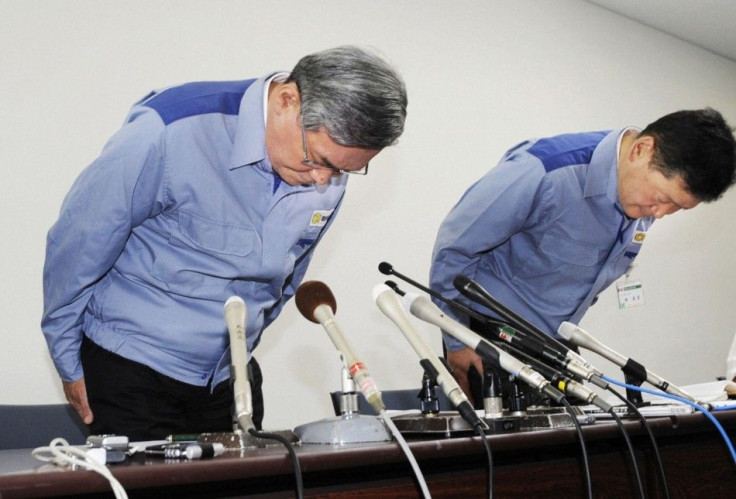Japanese Asked To Conserve Electricity As Local Politicians Block Nuclear Restart

As salarymen, office ladies, and temp workers go on their commutes all across Japan this summer, they will once more be walking into offices open to the sweltering conditions of a Japanese heat wave.
Concerned about power shortages across the country during energy-intensive summer months, largely due to missing supply from offline nuclear power plants, the Japanese government is again asking businesses and homes to conserve electricity.
There has been no mandatory order to cut usage, but households and companies are largely expected to do their part to cut use of electricity and take pressure off from an already stressed power grid. Western Japan's Kansai region is being expected to save 15 percent, higher than other locations. The government enforced a mandatory cut in Eastern Japan in the aftermath of the trifecta earthquake - tsunami - nuclear disaster that crippled Northeastern Japan in March of 2011.
Power saving is seen as economically damaging to Japan's more energy-intensive factories and the manufacturing sector in general. Experts are worried that further demands to restrict power use could drive companies to move production facilities overseas, hurting the stagnant Japanese economy.
Akio Toyoda, the grandson of Toyota Motor Corp (Tokyo: 7203, NYSE: TM) founder Kiichiro Toyoda, and present CEO and President -- recently appointed to chair the influential Japan Automobile Manufacturers Association -- said on Thursday that Japanese carmakers are not coordinating to deal with the summer power shortages.
The summertime power conservation is expected to start at the beginning of July and end after the first week of September.
There is particular concern over the densely populated Kansai region with the cities of Kobe - Osaka - Kyoto, which have relied heavily on nuclear energy. The region's electric utility provider, Kansai Electric Power Company Inc. (Tokyo: 9503), originally operated 11 nuclear reactors that in turn contributed around 40 percent of the region's supply before reactor closures began after the disaster of March 2011. Japan as a whole used to rely on nuclear energy for 30 percent of its power.
Currently no nuclear plants are operating in Japan, and the shortfall is being made up by greater imports of coal and natural gas from abroad.
In a fresh new development in Japanese politics, regional governments have become especially critical of how higher-level authorities have handled the nuclear disaster. They have blamed the national government for poor transparency and unaccountability in nuclear safety investigations across the country. Politicians in the Kansai area have been especially resistant to nuclear reactor restarts.
The Mayor of Osaka (Japan's second largest city) Toru Hashimoto, is receiving national attention for his opposition to the restart of Kansai Electric's nuclear reactors. Japanese Prime Minister Yoshihiko Noda said on Thursday that he will shortly make a final decision on whether to restart any or all of the 4 reactors at the Oi plant which previously supplied Osaka. Hashimoto said the national government is ignoring due process in nuclear inspections on April 5, working to protect corporate interests as a rubber stamp rather than acting to hold the Nuclear Industrial Safety Agency, the country's nuclear regulator, more accountable.
The Oi reactors are located in Fukui Prefecture, next to the Sea of Japan, 140 kilometers or 86 miles to the north of Osaka.
National campaigns and citizen responsibility are something of a tradition in Japan and people there are no strangers to energy conservation. The Japanese Ministry of the Environment has been supporting summertime energy-saving measures since 2005, when it started the 'Cool-Biz campaign'. Businesses around the country were encouraged to kept air conditioning low and adopt a more summer-appropriate dress code.
Businessmen across the country took to wearing short-sleeved shirts, initially awkward in a country where stricter dress codes are common. But last summer, the initiative was upgraded to 'Super-Cool-Biz' in the aftermath of the nuclear disaster. Publicity campaigns showed office workers in Okinawan-style kariyushi shirts (much like the flowery Hawaiian shirt).
The casual dress code campaign, however, is unlikely to temper the unease of citizens still concerned about nuclear safety, now invigorated by local politicians who are taking a stand to champion suspicions of close links between the national government, the media, and power companies.
On May 15, the chairman of the Tokyo Electric Power Co. (Tokyo: 9501) which operated the Fukushima nuclear power plant, Tsunehisa Katsumata, directed blame for the Fukushima nuclear disaster to the former Prime Minister Naoto Kan. Absent at the time in China, Katsumata said that It's difficult to tell what I could have done even if I had not been absent.
His comments are unlikely to generate any sympathies from citizens of a country still mentally shaken from last year's disaster and now being asked to make further personal sacrifices.
© Copyright IBTimes 2025. All rights reserved.





















